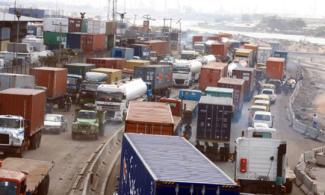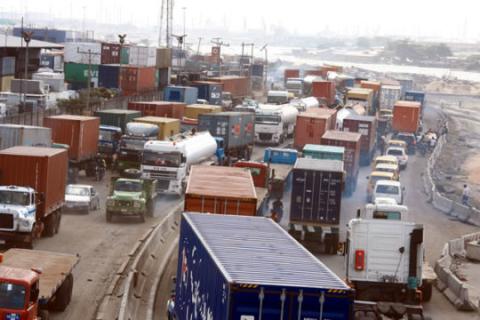
Some of the proposed measures to effectively decongest the roads were for empty containers heading to the ports without any business there to desist, while export containers/sided trucks and flatbeds are left inbound to the ports.

The Presidential Task Force on Apapa Gridlock, Wednesday said it would on Monday next week commence the impounding of errant and idle articulated vehicles on Lagos bridges and roads.
The resolution was made on Wednesday at the meeting of all stakeholders in Apapa gridlock, which held at the Nigerian Navy Ship (NNS) BEECROFT conference room, in Lagos. The taskforce Chairman, Commodore Okon Eyo, who made this disclosure at the stakeholders meeting, said the punitive measure only applies to non-compliant drivers of articulated vehicles- either tanker and truck drivers.
Eyo, who is also the Commander NNS Beecroft, said the enforcement took this long because the holding bays to accommodate the trucks and other modalities needed to be put in place.
The stakeholders meeting was a fallout of the previous meeting held with the Vice President, Prof. Yemi Osinbajo; Lagos State Governor, Akinwunmi Ambode and other critical stakeholders in the efforts at decongesting Apapa gridlock.
Some of the proposed measures to effectively decongest the roads were for empty containers heading to the ports without any business there to desist, while export containers/sided trucks and flatbeds are left inbound to the ports.
Others include coordinating large haulage companies or anyone wishing to move 10 trucks or more in one day, monitoring the operation of holding bays, parking instructions and management of broken down vehicles, as well as stopping non-ports bound traffic like tankers and trucks going to private premises.
The stakeholders meeting also addressed the issue of complaints of extortion, brutalism, preferential treatment and the ineffectiveness of the applied strategies by the security task force. They also addressed the challenge of poor road network, recalcitrant drivers, intimidating and threatening posture of groups and unions, sometimes even to the extent of blackmail, as well as transporters’ subtle and overt inducement of traffic personnel and uncooperative attitude of terminal operators and shipping agencies.
Other challenges include ineffective NPA call-up system, unprofessional conduct of the task force personnel, continued use of the bridges as parks, non-operationalisation of the holding bays, use of dilapidated and rickety vehicles and logistics shortfall for the taskforce including manning shortage.
In an interview with journalists afterwards, Eyo said, “Before now, we have had series of meetings on the gridlock but now, we are going to return all empty containers on the road to the holding bays
“Articulated vehicles henceforth are no longer allowed to be on the roads and bridges but at the holding bays and from there, they would be programmed between the agencies, terminal operators and NPA management.
“These agencies will then generate call cards for the articulated vehicles. The call cards is what the security agencies will be checking on the roads.